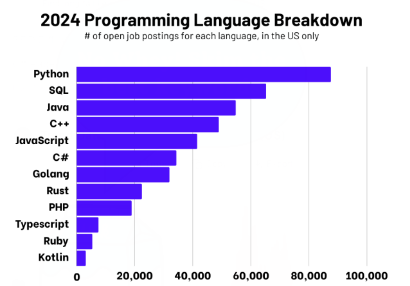In the rapidly evolving tech landscape, staying updated with the most in-demand programming languages is essential for anyone looking to excel in coding. Whether you’re a beginner or an experienced developer, mastering the right languages can significantly enhance your career opportunities and enable you to work on cutting-edge projects.
With technology continuously advancing, the year 2024 brings new trends and demands in the programming world. In this blog, we will explore the top programming languages to learn in 2024, highlighting their applications, popularity, and why they are crucial for success in various fields such as web development, AI, data science, and more.
What are programming languages?
Programming languages are formal instructions that allow humans to communicate with computers to create software, applications, and websites. Each language, such as Python, Java, JavaScript, and C++, has specific uses, from web development to data processing. By mastering these languages, developers can buld everything from simple websites to complex systems, making programming languages the backbone of modern technology.
Types of programming languages
When exploring the best programming languages to learn, it’s important to understand that there are various types of programming languages, each offering unique advantages and limitations.
Here are the main categories of programming languages:
Procedural Programming Languages: These languages focus on solving problems by following a sequence of step-by-step instructions. Popular examples include C, COBOL, BASIC, and Pascal.
Functional Programming Languages: These prioritize manipulating data structures without altering the original data, leading to more predictable outcomes. Haskell and Scala are well-known functional languages.
Object-Oriented Programming Languages: Programs in these languages revolve around objects that store data (properties) and perform actions (methods). Python, Java, and C++ are widely used examples.
Scripting and Dynamic Languages: Lightweight languages used for automating tasks and adding interactivity to websites. JavaScript and Ruby are common scripting languages.
Logic Programming Languages: Focused on problem-solving through logical reasoning, these languages are often used in AI applications. Prolog is a key example of a logic programming language.
Pursuing a coding bootcamp is an excellent way to quickly learn various programming languages, as these intensive programs focus on practical, hands-on training. Bootcamps typically cover in-demand languages like Python, JavaScript, and Java, allowing students to build real-world projects and gain industry-relevant skills in a short time. Aspiring tech-savvy professionals are increasingly opting for bootcamps because they offer a faster, more focused path to a coding career compared to traditional education.
Top Programming Languages for Coding
Python
Python is widely known for its simplicity, readability, and versatility, making it an excellent choice for both beginners and professionals. It’s used extensively in web development, data science, artificial intelligence (AI), and machine learning (ML). With powerful libraries like Django (for web applications) and TensorFlow (for AI), Python allows developers to create robust applications efficiently. Its cross-platform capabilities and supportive community make Python a top programming language across various fields, including automation, scientific computing, and backend development.
JavaScript
JavaScript is indispensable for web development, powering interactivity on websites and applications. It’s primarily used for front-end development but has also gained significant traction in back-end development through Node.js. JavaScript’s widespread use for creating dynamic websites, games, and mobile apps is complemented by popular frameworks like React, Angular, and Vue.js, which enhance its functionality. JavaScript is essential for developers looking to build full-stack solutions, making it one of the most in-demand languages today.
Java
Java has long been a favorite for enterprise-level applications and remains highly relevant due to its scalability, portability, and security. It powers Android app development and large-scale systems in banking, healthcare, and e-commerce. Java’s “write once, run anywhere” feature ensures that programs can be executed on any platform with minimal changes. With frameworks like Spring, Java is widely used for building secure, high-performance applications, making it a must-learn for those in enterprise software development.
C++
C++ is known for its speed and efficiency, making it ideal for performance-critical applications such as video games, real-time simulations, and embedded systems. As an extension of the C language, it supports both procedural and object-oriented programming, offering developers the flexibility to optimize programs down to the hardware level. C++ is also widely used in systems programming, operating systems, and game development engines like Unreal Engine, making it a staple language for performance-driven projects.
C#
C# is a versatile language developed by Microsoft and widely used for developing Windows applications, games (using Unity), and web applications (with .NET). Its ease of learning, strong integration with Microsoft’s development tools, and widespread use in enterprise solutions make it an attractive choice for developers. C# is also used in cloud computing, and its growing role in game development has made it essential for those looking to work in the gaming industry.
Swift
Swift is the language of choice for iOS, macOS, watchOS, and tvOS development. Designed by Apple to be fast, safe, and efficient, Swift is favored for building mobile apps in the Apple ecosystem. Its concise syntax, high performance, and security features make it ideal for developers focusing on mobile app development. Swift’s rapid adoption for iOS app development, driven by the booming mobile app market, positions it as a top language for aspiring mobile developers.
Go (Golang)
Go, or Golang, is a language developed by Google, known for its simplicity, efficiency, and strong support for concurrency. Go is especially suited for cloud computing, microservices, and distributed systems, thanks to its ability to handle multiple processes simultaneously. Its growing popularity for building large-scale applications, combined with its use in platforms like Docker and Kubernetes, makes Go essential for developers interested in scalable web services and modern cloud infrastructure.
Kotlin
Kotlin has emerged as the preferred language for Android app development, supported by Google as the primary language for Android. Kotlin offers cleaner syntax and more concise code compared to Java, reducing the chances of errors. Fully interoperable with Java, Kotlin simplifies the Android development process, making it easier for developers to transition from Java-based apps. With its modern features and increasing demand in mobile development, Kotlin is a must-learn for Android developers.
Rust
Rust is a systems programming language that focuses on safety, concurrency, and performance. It is particularly well-known for its ability to prevent common bugs like memory leaks and data races, which makes it ideal for building reliable and secure software. Rust is used in systems programming, game engines, and browser components (Mozilla’s Servo engine is written in Rust). Its focus on safety without sacrificing speed has made it a rapidly growing language in the developer community, especially for performance-critical applications.
R
R is a powerful language used primarily for statistical computing, data analysis, and data visualization. It is widely adopted by data scientists, statisticians, and researchers for tasks like predictive modeling, data mining, and generating visualizations. R’s strong ecosystem, with packages like ggplot2 and dplyr, makes it highly effective for handling large datasets and complex statistical analysis. Although Python has gained traction in data science, R remains a go-to language for professionals focused on deep statistical research.
TypeScript
TypeScript is a superset of JavaScript that adds static typing, making it more suitable for large-scale applications. By catching errors at compile time rather than run time, TypeScript improves code maintainability and scalability. It is widely used in enterprise applications, especially for developing large, complex web applications. TypeScript’s compatibility with JavaScript frameworks like Angular and React, along with its increased reliability in managing growing codebases, makes it a valuable skill for developers.
SQL
SQL (Structured Query Language) is important for managing and querying relational databases. It allows developers and data analysts to retrieve, manipulate, and manage data stored in databases like MySQL, PostgreSQL, and Microsoft SQL Server. SQL is widely used in web development, data science, and business intelligence to manage data effectively. As data continues to drive decision-making across industries, SQL remains a crucial tool for developers and analysts alike.
Conclusion
Learning the top programming languages in 2024 is crucial for staying competitive in the tech world. Pursuing a programming bootcamp offers an accelerated path to mastering these languages through hands-on projects and real-world applications. Bootcamps provide focused, practical training, helping aspiring developers quickly gain expertise in the most in-demand programming languages for a successful coding career.


